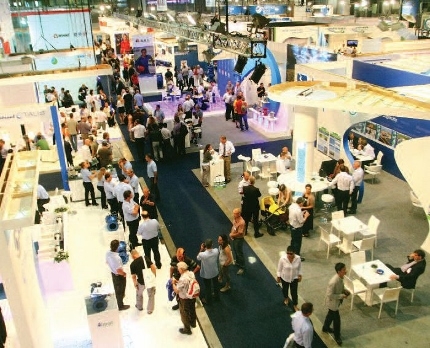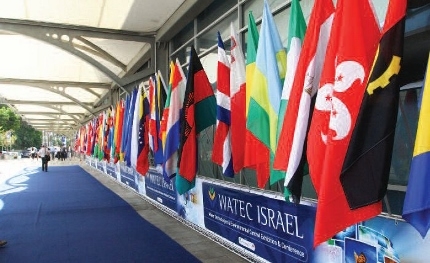Water: Ripples Spread out from Israel
"Water, water everywhere, nor any drop to drink" – but maybe not for long
(The message of WATEC 2015).
My visit to WATEC, the 8th International Exhibition and 5th International Conference on Water Technologies and Environmental Control, held at Tel Aviv's Fair Grounds in October 2015, promised to revise that famous phrase. The conference motto ― "Water Efficiency ― Wisdom in Every Drop" ― clearly captured the upbeat note and expanding horizon of Israel's water industry.
It was really enlightening, and I must admit, heartwarming to see so many people, especially women, and so many products gathering to further the purification and more efficient use of water. It was also wonderful to learn that despite the politics, when you get down to substantive needs, so many countries were happy to cooperate with Israel to bring advanced technologies back home with them. This included China as well as Mexico, California and the United States. As a matter of fact, despite the acts of terrorism in Jerusalem and fears of its spreading throughout Israel, 8,000 representatives from all over the world attended the exhibit and lecture series.
While walking around the technical exhibits I learned how familiar words ― innovation, sustainability, management, financing, purification, reverse osmosis and so forth ― were used in the real world of water. For the first time in my life, I came face-to-face with portable purification vehicles capable of reaching remote communities and villages in crisis, to demonstrations of "digester and biogas treatment" and "sludge dewatering" systems, to compost purification vessels, to pails of chemicals for disinfecting fruits and vegetables after harvesting. There were electrodes and devices for removing rock particles from water systems as well as wireless solutions, connected to the Internet, meant to upgrade existing water monitoring systems at low cost. Economic efficiency and health concerns were firmly coupled with ecological soundness among the inventors, engineers and producers involved in creating, improving and monitoring water and waste systems. I felt like Alice in a new-age Wonderland, with the Cheshire Cat resembling lab technicians more than furry animals. I had a great time among these fascinating toys.
With respect to drinking water and plastic: - according to Yossi Yaacoby, Chairman of WATEC Israel 2015, tap water throughout the western world is clean and drinkable. So, forget those plastic bottles and open the faucet just about everywhere..
But water, like so much in life, is not just what we think it is: a liquid. Beyond its obvious necessity and physical context (weather, geology, piping, etc.), water also means economics, politics and administration, as well as social status, with a large dose of history thrown in. This was brought home very concisely by three speakers from Brazil, Tashkent and China, respectively.
I begin with what was for me a shocking revelation, although one to be expected. Prof. Gesner Oliviera, an economist and consultant for the Brazilian government, stated that the water and sanitation tragedy affecting northern Brazil, a region with sufficient water and rainfall, was affected by culture and economics. By culture he meant that people were more willing to pay for drinking water than for sewage treatment; by economics he revealed that the amount of water needed by a community was estimated according to average income: wealthier communities need more water; poorer communities less. One method considered to better manage the imbalance was to pay people to reduce consumption, although this has been found to be very costly.
The role of history and government (or politics and bureaucracy) was brought home by Prof. Dukhovny from Tashkent. He spoke about "hydro-egoism", an attitude that might well describe Middle Eastern water management as well. The decentralization that was instituted after the fall of the USSR created a set of local bureaucracies, each controlling its own water system and each using its own way of running them. Without a strong umbrella government, these agencies are having difficulty cooperating in order to solve the region's supply problems. Jurisdiction over the region's water is limited, and few want to share their water for the entire region's benefit. Consider the Aral Sea, formerly the world's fourth largest lake by area, which is drying up, with 60% of its eastern part reduced to salt. The problem started in the 1950s, when Nikita Khrushchev ordered diversion of the two rivers feeding into the saline lake in order to irrigate the surrounding desert and support agricultural development. The plan failed, with 25% to 75% of the water soaked into the sand and essentially wasted. An ecological and health disaster followed. The five-region interstate commission set up in 1993 to save the Aral Sea still isn't working efficiently due to a lack of cooperation, again based on narrow local considerations and organizational culture.
On a more positive note, but a bit far from the public eye at home, China and Israel are participating in a joint innovative Public-Private Partnership (PPP) project called the Shouguang Water City. Although other ventures are in place on a smaller scale, the Water City presents an ideal pilot for demonstrating how groundbreaking Israeli water technologies can be utilized, not only in China but worldwide. The city of Shouguang, with a population of about 1 million and a dense physical and varied economic structure as well as severe water shortages, is in effect a microcosm of the way in which China is developing. Ophir Gore, head of the trade mission at Israel's Embassy in Beijing, and Adi Yefet, the Program Director for Water Promotion, the Ministry of the Economy, together with five speakers from China, explained why these characteristics, together with the local government's dedication to the project, will increase the likelihood of its success in meeting the city's needs and status as a showcase for Israeli capabilities in technology and management.
Attending WATEC was an experience on all accounts. Informative to the point of being overwhelming, and so very encouraging.










Comments